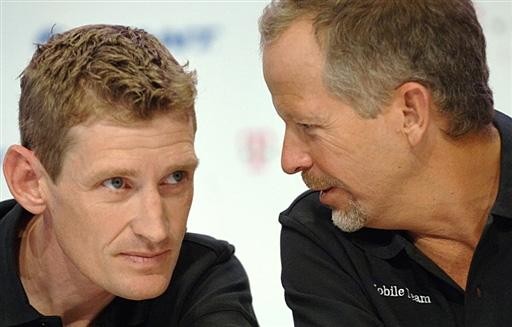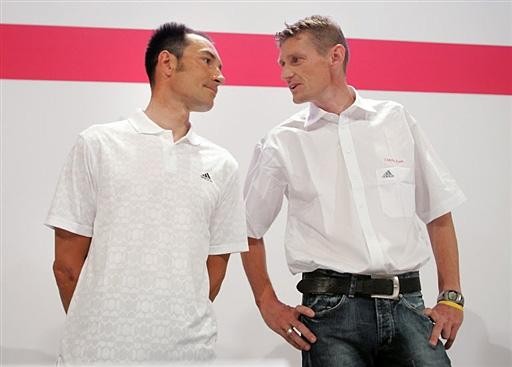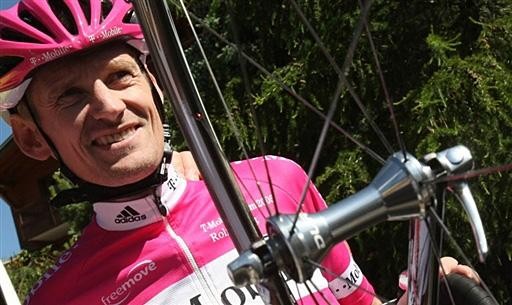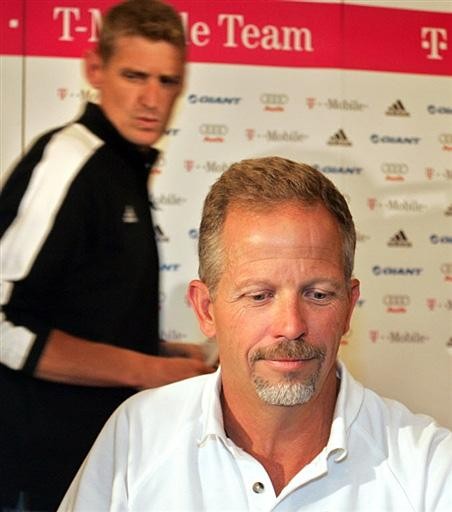Rolf Aldag: The German Shepherd
In the movie "The Shining" there's a moment of chilling cinematic history as the camera slowly...




An interview with Rolf Aldag, December 29, 2008
Rolf Aldag, the Team Columbia directeur sportif, sat down with Cyclingnews' Daniel Benson at the squad's camp in Majorca, Spain earlier this month to chat about his history with doping, how Bob Stapleton saved his career and how he's helping to change the culture in the sport.
In the movie "The Shining" there's a moment of chilling cinematic history as the camera slowly focuses on a framed picture of Jack Nicholson. Fixed, sickening grin from ear to ear, it's enough to give you nightmares. What's that got to do with cycling? Well, I'm standing in the Robinson Hotel, Majorca, for Team Columbia's training camp. It's the same location used by the now defunct Telekom team and I'm about to meet Rolf Aldag, who has worked through both regimes – first as a rider and now as a directeur sportif. On a wall in the lobby is a photo of Telekom in its prime. It's a squad shot with familiar faces: Jan Ullrich, Santiago Botero, Alexander Vinokourov and Aldag. Like Nicholson, they're all grinning from ear to ear. For everything it signifies within the world of cycling, it's as scary as Nicholson's portrait.
When I find Aldag he is sitting alongside Erik Zabel, once his Six Day partner and teammate who has joined the camp as an advisor to the team's sprinters, and other Team Columbia riders for dinner. They're laughing, and although I can't make the subject (perhaps it's the photos), the mood seems relaxed. The Columbia director is still as lean as a bean, his gangly frame arched over a table in a restaurant he's probably eaten at for the many of the fifteen years he spent as a rider.
As I join the party and Aldag's friends disperse his friendly mood remains. It's obvious why the team hold him in such high regard. But before Aldag reinvented himself as a directeur sportif and dived in to help save the team he called home from complete collapse, there was a point when the German came close to throwing in the towel. "If I hadn't had Bob Stapleton and the riders' support it might have been the end for me. I would have still confessed but under very different expectations, and yes, it was still very difficult," he says.
On 24 May 2007 Aldag, together with then Telekom team mate Erik Zabel, admitted to taking Erythropoietin. He apologised for the lies and hurt caused for cheating a sport that he clearly does still love. "Bob was a real rock. He could have made a different decision and told me to pack my bags. That would have been very easy for him to do, and there was a lot of pressure for that to happen."
Easy choice it may have been, Stapleton refused to push Aldag off the cliff his German lieutenant was teetering over. "It shows that he believes in my ability, and make no mistake, there are plenty of people who would want my job. But we drew a line and said, this is the past and we draw the line here and make sure this never happens on this team."
Get The Leadout Newsletter
The latest race content, interviews, features, reviews and expert buying guides, direct to your inbox!
When Stapleton sat down with Aldag before his confessional press conference he probably had little knowledge just how widespread doping had been with the team he'd taken over. He probably listened intently as Aldag ran through the methodical practices of team doctors. Doctors that may have attended Telekom's training camps right here in Majorca. It must have been a hard pill to swallow for the American high-roller. Yet, credit to Stapleton, Aldag remained.
"It came down to a case of credibility. There were a lot of interviews and as a rider you never know what to say. Cameras in your face, you just don't know what to do. But as a director I had a responsibility to not just myself but the team and our young riders. So what do you do? Do you say, 'no in my time we never doped' or do you say, 'okay, this is what it is and this is how I see it?'"
A bold statement, but one that comes over as sincere and genuine. Ever more so as the sport continues to be dogged by hangers-on and gagged by a convenient Omertà label. Aldag is trying to make up for his past in his new role, and by drawing his line he could therefore gain the complete trust of the team and the riders. Although he and Stapleton will dismiss the idea of self-redemption, it's certainly present in the German's conduct and the way he talks.
"Whatever you want to ask about, I will tell you. That's what I said to the riders so that they can decide if they want to believe me. It takes the assumption out so the riders don't think 'well, everyone did something, probably he did too.' We had riders who didn't understand why I doped and who will never dope themselves. I accept that and take my hat off to their character." The fact that the team and specifically the riders never question Aldag on his past show just how far he has affected the team in a positive way and how any past misgivings have been accepted by the riders, at least publicly.
The new generation of professionals have the guidance of people like Aldag, but his former teammate Jan Ullrich was once a young and impressionable rider. Where was the guidance and help then? "I can't say what he did or didn't do, because I just don't know, but he went from nothing to the top in one year.
"He never had a chance to learn from his mistakes, he was just too well-protected so he could never find his own way, and his direction was already decided. His interviews in the early years were boring, always the same cliches, you never heard what he thought. If he said anything someone would be kicking his leg under the table and stopping him from causing any trouble."
The next generation
It's clear Aldag would now protect a rider under his wing in a different manner. Instead of grooming the youth in the belief that one day they'll win the Tour when it might not be a realistic aim, he and Stapleton are prepared to experiment with various protégés. Hence a rider like Edvald Boasson Hagen raced over 100 days this year, from classics, to high mountains to week-long stage races with the preconceived plan of winning the overall. It wasn't a case of trying to reap a young rider's talent for all its worth, more a case of finding out what the rider enjoys and where his future lies.
"Why say to a rider, one day you can win the Tour. In five years it's your goal. What's the point of that? You can't plan for that. Set goals that are realistic, and achieve them piece by piece. Why say, you are the man for 2015? It just adds unwanted pressure to young shoulders," says Aldag.
His time at Telekom has given him excellent judgment when it comes to rider management and molding a team. As a rider Aldag was rare breed: able to transfer his skills from the cobbles of Roubaix to the hills of Liège and the peaks of the Tour. He saw first hand how cliques and problems amongst riders arose. "I was really flexible as a rider, not a huge talent but I tried to adapt. So I was in the Classics team and the Grand Tour team. So, actually I was everywhere and everything, doing over 100 days of racing a year. So I had a good view on how things should work and how they shouldn't. That was a huge benefit for me and one I'm able to apply here."
As directeur sportif his principal role was to create an environment for success. It wasn't just about winning races - although 80 wins this year is still a huge achievement. "We have great people here and that was the first step. You don't want a team of 25 robots but at the same time you don't want 25 comedians. It's a balance." It's another element that he's probably also picked up from his days at Telekom, where the team, despite their unlimited budgets, was never able to work cohesively toward their biggest objective come July.
And unlike Telekom's controlling ways, Aldag is far more willing for others to take responsibility. "My way of working isn't to try and control people but to find people's strengths and work with them that way. Look at Allan Peiper, he's a great director. He's always on the computer working on schedules and he's always great at that part of the job and it's not something everyone can do.
"Then we have guys who are great at motivating certain riders, like Kim Kirchen. They know when to leave him alone and when to turn the screw and get him to really work and focus. I can't do everything on my own and I don't want to. It's important to give a lot of trust. I'll step in when I need to, but everyone in the set up likes to have bit of freedom and space to play around with."
It is obviously not going to be easy to win another 85 races in 2009. For Aldag, though, that's only the reward for the hard work the entire team put in. For next year it will once again be about giving the young riders a chance and bringing them to the next level. "For me the biggest fun isn't winning the Tour with a superstar but instead bringing these young guys on and seeing them improve. Cycling is my life and you can't calculate how much I enjoy it. How much money I make isn't important, it's just a passion that I have."
A lot has happened since those Telekom images were taken and cycling has changed, arguably for the better. Aldag is now second-in-command at Columbia and an integral part of Stapleton's plans, while many of those Telekom riders have either retired or faced the consequences for their misdemeanours. Columbia's efforts to promote transparency and their relationship with anti-doping expert Don Catlin should give all cycling fans something to grin about. It's probably about time that we saw another set of team images in the lobby wall at Hotel Robinson.
Related content:
News feature: T-Mobile press conference on sponsorship
News feature: T-Mobile becomes High Road
Bob Stapleton on new anti-doping programme
Team High Road presentation
High Road's Stapleton on Columbia future